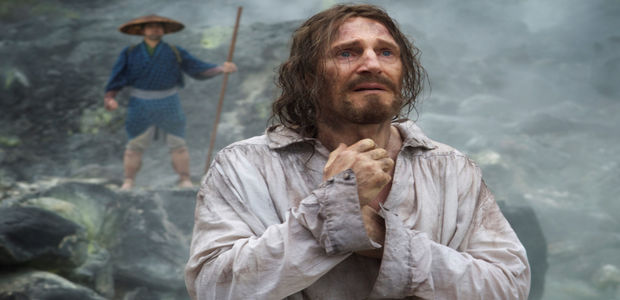28 years – That’s how long director Martin Scorsese took to conceive this film. Based on a 1966 novel of the same name by Shūsaku Endō, a Japanese author inspired by Christian dogma, Silence marks the 75-year-old director’s 25th feature film in a career spanning half a century. It’s a passion project and every great filmmaker has at least one of these films that take a considerable amount of time to produce. For this reason and more, Silence has the potential to be Scorsese’s magnum opus but only time will tell if this film reaches that level of reverence. It is a powerful film and an important one too as an epic reiteration of the persecution of Christians in 17th century Japan; Important, because discrimination against one’s beliefs exists today as it has throughout history. The existence of God, and whether religion is flawed has not only been the subject of debate for centuries but also the cause of several genocides that have resulted in the massacre of millions. Using this argument and based on an actual event as chronicled by Endō, Silence is an examination into questions relating to faith, spirituality, and atonement.
In broadening the scope of these questions, we follow the journey of Catholic priests Father Rodrigues (Andrew Garfield) and Father Garrpe (Adam Driver) from Portugal to Japan to find their mentor Father Ferreira (Liam Neeson) who is reported to have been tortured into renouncing his faith. This is a time when most of Japan is still under feudal law where villages are governed by unflinching Samurai lords (chillingly represented by Japanese actor Issei Ogata). They take on the role of ‘inquisitors’ who capture and torture Christians in the belief that no religion can take root in Japan simply because religion and its doctrines are manmade, whereas true spirituality can only come from nature. In witnessing unspeakable torture exerted on other Christians, Rodrigues prepares for martyrdom but his captors have a cruel plan in place – commit apostasy by openly rejecting his faith, or watch an entire village put to death by refusing to do so. Worse still, all his fervent prayers for deliverance are met with…silence.
With a run time of 160 minutes, it’s a sluggish film to get through and it isn’t for everyone either. It’s also an unusual narrative given the director’s affection for epic crime films. But Scorsese is onto something profound because at the heart of the film are bold and provocative questions on theology and our finite understanding on something as infinite as creation itself. This is reserved for the third act when Neeson’s character surfaces with some very logical statements on divinity that even staunch Catholics will find taxing to digest. This is the strongest part of the film and yet, Scorsese’s broad strokes aren’t about good versus evil, and violence though hellish, is not about hatred inflicted by one religion on another. Although the film’s climactic moment is whether Rodrigues apostatises his faith, the conclusion demands psychological insight into the boundless characteristics of love, where sacrifice is at the pinnacle of a triangular relationship between love and loss. In a way this is a paradox embedded in a complex narrative but one that might require multiple viewings to fully understand the inner conflicts associated with the solitary nature of silence.
The use of that silence is a little too literal in the film too, with barely any soundtrack or background music. Without which, scenes that convey emotional gravitas loses some of that intensity. There are also issues with accents that feel out of place, yet none of these quibbles stack up to Scorsese’s grand fresco of an age old battle between man and his own worst enemy – his soul. After all, Scorsese himself once studied to be a priest but somewhere along those 50 years as a filmmaker, lost his soul to cinema. Judging from the austerity of this film, that’s a good thing.
Rating: 





Pingback: Out This Week: 02 February 2017()